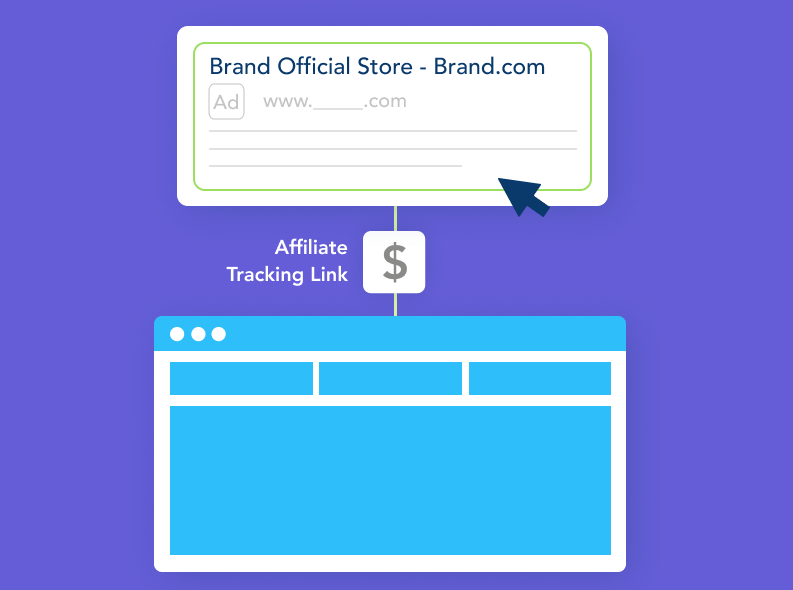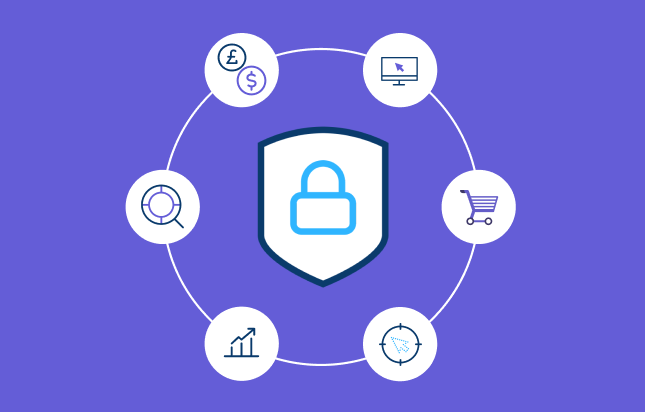Demystifying Ad Hijacking: A hidden threat to your online presence
Have you ever clicked on an ad for a brand, only to land on a strange website? This deceptive practice, known as ad hijacking, can steal your clicks and revenue, leaving both advertisers and users frustrated. Read on to uncover more about ad hijacking – how it works, the risks it poses, and how to protect your brand.
What is Ad hijacking?
Ad hijacking (also referred to as brand poaching, direct linking, or URL jacking) occurs when an affiliate attempts to imitate a brand by running ads that closely resemble the brand’s own ads.
How does Ad Hijacking work?
Let’s break it down.
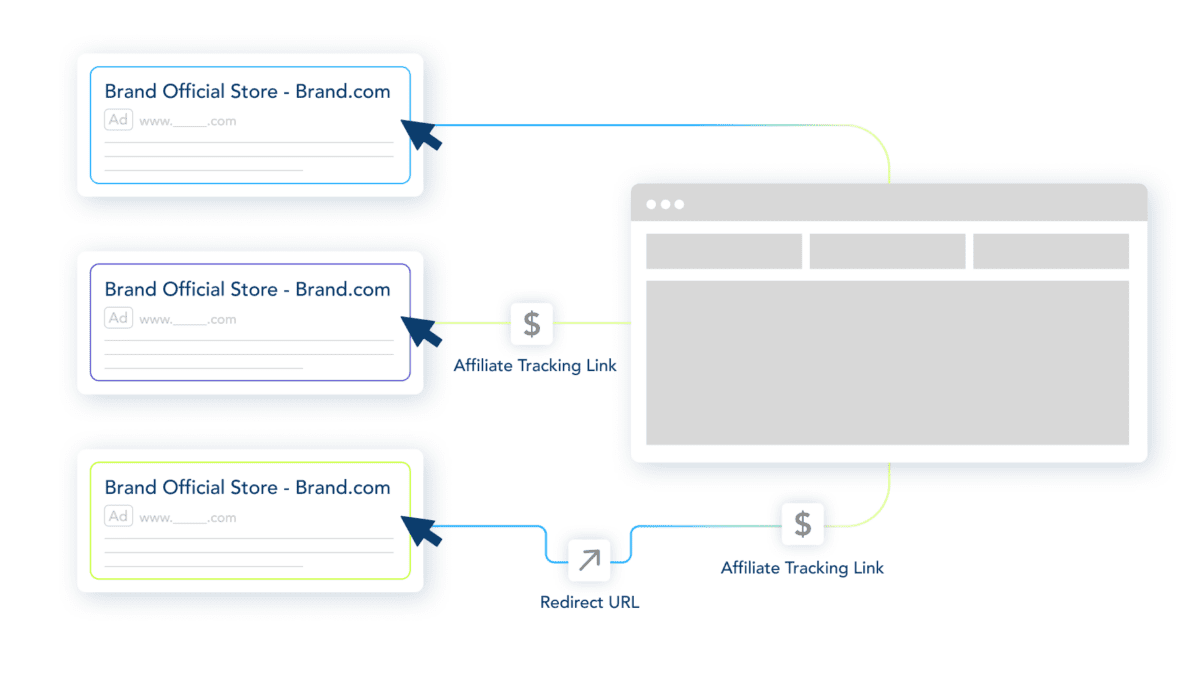
The first ad shown above is the brand’s ad that leads directly to their own site via the correct tracking link. The brand pays a few cents per click.
The second ad shows when an affiliate places an ad that goes immediately through their tracking link to the brand’s site. They therefore are stealing the commission on any subsequent purchase and are increasing the cost-per-click on branded search terms.
The third ad shows a more sophisticated affiliate ad hijacker, who places an ad and masks the referral through a series of redirect URLs. The affiliate hijacker receives an unearned commission and uses evasive techniques to avoid detection. This is particularly damaging to a brand’s affiliate marketing program because it’s virtually impossible to determine who the affiliate is without the help of a paid search monitoring tool.
This deceptive strategy leads to conversions and subsequent purchases. It enables the affiliate to earn a commission of 5-10% on these sales. Ad hijacking is resulting in a financial loss for the brands on two fronts:
- Affiliates illicitly acquire unearned commissions from brands.
- Affiliates inflate CPCs for brands on their own brand terms.
What does ad-hijacking look like?
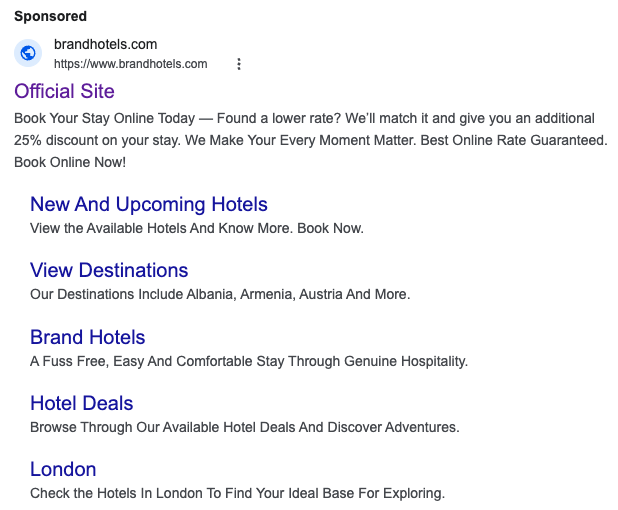
In this example, a brand violation instance has been captured for a hotel brand*. A search for “brandhotels.com” has returned the ad shown, which features the brand name in the display URL and site links.
However, the ad has not been placed by the hotel brand but instead by an affiliate bidding on “brandhotels.com.”
What are the risks?
Ad-hijacking in paid search poses several risks for both advertisers and users. Here’s a breakdown of the main challenges it can cause:
For Advertisers:
- Reduced traffic and sales: When users click on the hijacked ad instead of the official one, the advertiser loses valuable traffic and potential sales. This directly impacts their return on investment.
- Increased CPC: Ad hijackers bidding on the same keywords, especially branded ones, drive up the cost for the advertiser to appear in search results. This means the advertiser has to spend more to reach the same number of users.
- Channel conflict: If both the advertiser and the hijacker are using affiliate programs, it can create confusion and conflict. Metrics like impression share and revenue attribution become skewed, making it difficult to track campaign performance accurately.
- Brand reputation damage: When users click on a hijacked ad and have a negative experience, it can damage the brand’s reputation. This is especially true if the hijacked ad leads to a low-quality website or promotes misleading information.
For Users:
- Deception: Users are tricked into clicking on an ad that they might not have clicked on otherwise. This can lead to a feeling of being misled or scammed.
- Exposure to malicious websites: In some cases, hijacked ads can lead users to malicious websites that contain malware or attempt to steal personal information.
- Wasted time: Users who click on a hijacked ad expecting to find the official brand website will be disappointed and may waste valuable time navigating away from the irrelevant landing page.
How to track and monitor
Adthena’s Ad Hijacking Detection catches instances of ad hijacking instances from 50+ affiliate networks and sub-networks, providing:
- Continuous brand monitoring: Ad Hijacking Detection crawls search results for ads containing the advertiser’s brand terms, trademarks, and variations of those terms.
- Affiliate detection: Algorithms help to identify suspicious ad copy, landing pages, and affiliate links that could be used for ad hijacking.
- Alerting and reporting: Get notified when potential hijacking attempts are detected and view the infringing ad copy, landing page URLs, and the identified affiliates.
- Take down measures: Get the evidence you need, including affiliate ID so you can report the infringing ad to Google.
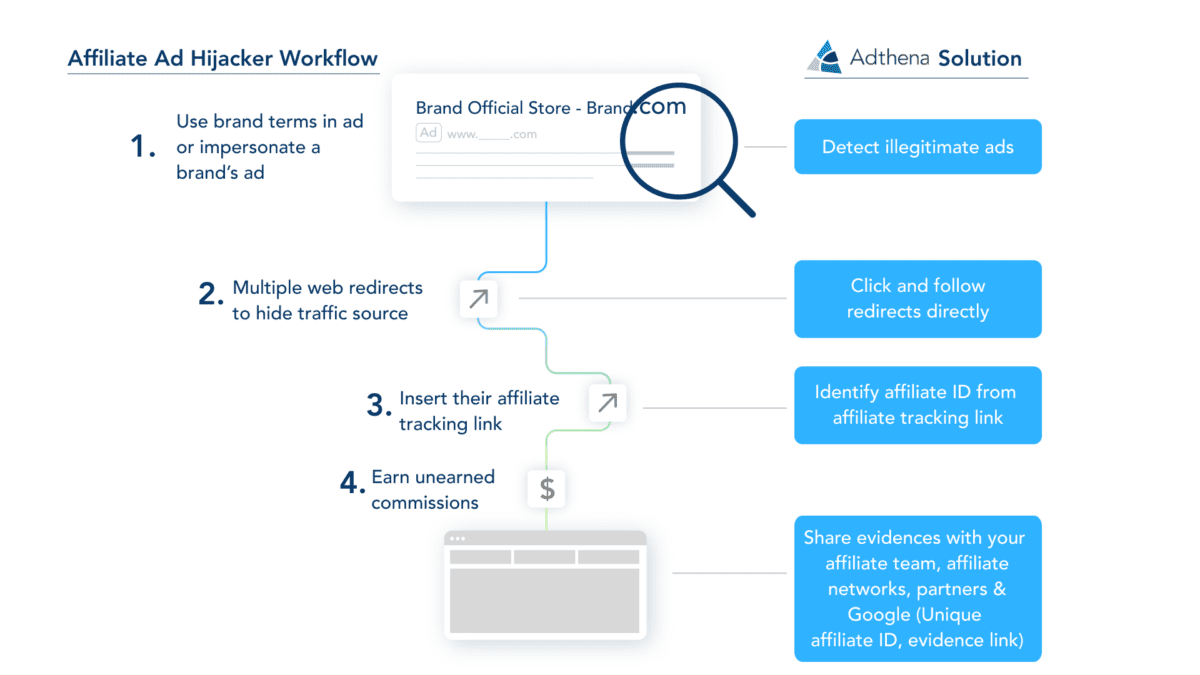
See Ad Hijacking Detection in action in a self-guided platform tour. Get started.
How do you know if your ads are being hijacked?
There are a few tell–tale signs that suggest you may have fallen victim to ad-hijacking. Keep a lookout for:
Performance changes in branded ads:
- Decreased impressions, clicks, and conversions: If you see a decline in clicks and conversions specifically for your branded ad campaigns, it could be a sign that hijacked ads are stealing clicks meant for your official ads.
- Unusual spikes in affiliate traffic: A sudden increase in referral traffic or conversions from a particular affiliate, especially one you’re not familiar with, could be a red flag.
Suspicious affiliate activity:
- Similar conversion rates: If an affiliate’s conversion rates are suspiciously close to your own branded ad campaigns, it might indicate they’re benefiting from clicks on hijacked ads.
- Mismatched URLs: Pay close attention to the landing page URLs associated with affiliates. If they don’t match your brand’s domain or contain suspicious redirects, it could be a sign of ad hijacking.
How to prevent
By being vigilant and monitoring your campaigns closely, you can take steps to identify and address ad hijacking attempts by affiliates.
Protect your brand:
- Strong trademark protection: Ensure your trademarks and brand terms are properly registered. This strengthens your legal ground if you need to take action against hijackers.
- Monitor brand mentions: Use brand monitoring tools to track online mentions of your brand, including search results. This can help you identify potential hijacking attempts early on.
Manage affiliate programs:
- Clear affiliate agreements: Clearly outline acceptable practices in your affiliate agreements and prohibit affiliates from bidding on your branded keywords or using misleading ad copy.
- Performance monitoring: Regularly monitor your affiliate program performance.
Utilize Paid Search tools:
- Negative keywords: Use negative keywords in your paid search campaigns to prevent your ads from showing for searches that include hijacked terms or variations of your brand name.
- Trademark bidding: Consider trademark bidding on your branded keywords. This can help ensure your ads appear prominently in search results.
- Brand protection solutions: Put a brand protection solution in place, such as Adthena’s Ad-hijacking Detection to detect and combat ad hijacking.
Take action against hijackers:
- Report infringing ads: Report any instances of ad hijacking to the relevant search engine platform.
- Terminate affiliate relationships: If you identify affiliates engaging in ad hijacking, terminate their agreements immediately.
Fight back and protect your brand
Ad hijacking is a sneaky threat, but by understanding its tactics and taking proactive measures, you can safeguard your brand reputation and advertising budget. Here’s a quick recap:
- Identify the signs: Monitor your branded ad performance for sudden drops or unusual affiliate activity.
- Protect your brand: Register trademarks and use brand monitoring tools to stay vigilant.
- Secure your affiliate program: Clearly define acceptable practices in affiliate agreements and utilize negative keywords and trademark bidding in your paid search campaigns.
- Consider brand protection solutions: Explore tools like Adthena’s Ad Hijacking Detection for advanced monitoring and defence.
- Take action: Report hijacked ads to search engines and terminate relationships with rogue affiliates.
By staying informed and implementing these strategies, you can ensure your brand controls its online presence and delivers the best possible experience for your customers.
Are your branded keywords being hijacked by your affiliates? Book a demo to get started with Ad Hijacking Detection.
*Band name has been changed for anonymity.
